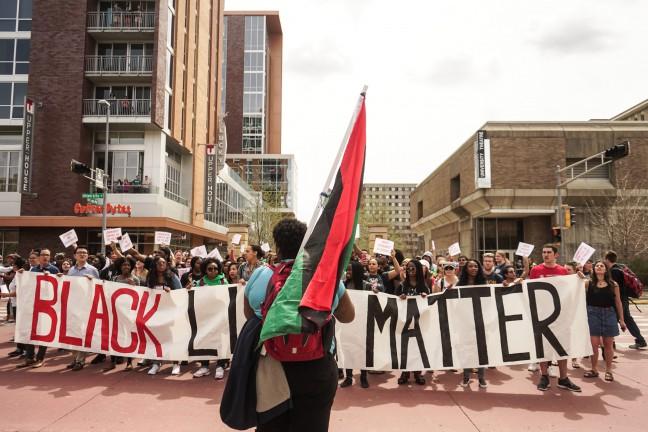As both cities and college campuses nationwide move forward to promote inclusivity and equality within their respective communities, an organization wants to implement policies from the national platform aimed at addressing disparities in the black community in Madison.
Movement for Black Lives, a national campaign that contains about 50 organizations advocating for black empowerment, released a comprehensive platform in August called “Vision For Black Lives,” which addresses solutions to issues in the black community.
M. Adams, Freedom, Inc. co-executive director and member of the leadership team at Movement for Black Lives, helped construct the national platform. In a meeting last month, she announced Freedom, Inc.’s intent in implementing some of the policies locally in Madison.
M4BL’s proposed platform contains policies and solutions that target six “buckets,” or categories — including economic justice and political power — to improve racial disparities and the social, economic and political status of black people, Adams said.
“The platform is one piece in addition to the fabric and vision towards black liberation, freedom and dignity,” Adams said. “The way to really understand what the platform is is to see it as a way of articulating what we want, targeting who should be doing these things and where we should be getting these things from.”
Each of the six categories has a collection of proposed actions which target how they plan to implement M4BL’s vision both locally and nationally.
One central part of the Vision For Black Lives is the intersectional framework it is constructed on to include all different identities, Adams said.
“We work with folks who are queer, LGBTQ, working class, women, [people who have] disabilities and have been incarcerated,” Adams said. “We work with a whole bunch of different people, so we really embody the principles that are talked about.”
One policy Freedom, Inc. wants to focus on is more community control of the police. According to M4BL, this will give direct control to communities most affected by police brutality over law enforcement practices and policies.
The investment in this particular category came as a result of the shooting of unarmed 19-year-old Tony Robinson by a Madison police officer, Adams said. Freedom, Inc. heavily supports the campaign “Justice for Tony Robinson,” which was created in response to the shooting.
Many of the outlines in the platform could also be applied to universities and black students to foster a culturally competent staff, curriculum and safe environment for students of color.
One important issue for the University of Wisconsin campus is preserving the ethnic studies requirement and implementing more cultural competency requirements to educate the majority white student body, Adams said.
UW officials unveil initiatives to address campus racial climate
Anti-blackness is present in academia, Marquise Mays, UW junior and president of Wisconsin Black Student Union, said. He said he feels he can only fully express his black identity in classes focused on race.
Having a platform like M4BL’s on campus is important because it allows people to realize there must be a “vision for students of color on a predominantly white campus,” Mays said.
“I feel like when people think about Black Lives Matter, they are so quick to look at the language of it instead of the actual things we are requesting for our lives to matter,” Mays said. “I think that the Vision For Black Lives is directly hitting those institutional systemic barriers that continue to hold us back.”
Setting out to provide a welcoming environment for black students on campus, WBSU recently held a workshop for students of color focused on healing, meditation and how to preserve a healthy mind. Mays said WBSU is focusing on providing a sense of community to black students and preserving their livelihood.
Moving forward, Adams said she believes the platform is an important way for the university to implement a more educated and racially competent atmosphere.
“You cannot expect to have black students strive and do well while they don’t feel welcome on campus,” Adams said. “There are many pieces of the platform that the university should take in order to create a climate in the educational system in which black students can do well.”


